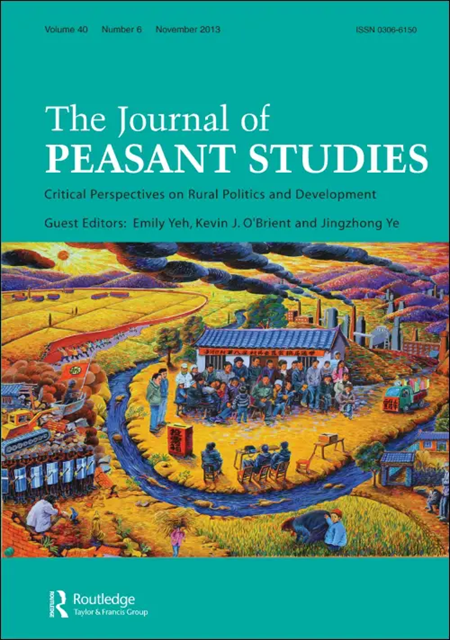Food sovereignty: forgotten genealogies and future regulatory challenges
IF 4.8
1区 社会学
Q1 ANTHROPOLOGY
引用次数: 242
Abstract
‘Food sovereignty’ has become a mobilizing frame for social movements, a set of legal norms and practices aimed at transforming food and agriculture systems, and a free-floating signifier filled with varying kinds of content. Canonical accounts credit the Vía Campesina transnational agrarian movement with coining and elaborating the term, but its proximate origins are actually in an early 1980s Mexican government program. Central American activists nonetheless appropriated and redefined it in the late 1980s. Advocates typically suggest that ‘food sovereignty’ is diametrically opposed to ‘food security’, but historically there actually has been considerable slippage and overlap between these concepts. Food sovereignty theory has usually failed to indicate whether the ‘sovereign’ is the nation, region or locality, or ‘the people’. This lack of specificity about the sovereign feeds a reluctance to think concretely about the regulatory mechanisms necessary to consolidate and enforce food sovereignty, particularly limitations on long-distance and international trade and on firm and farm size. Several regulatory possibilities are mentioned and found wanting. Finally, entrenched consumer needs and desires related to internationally-traded products – from coffee to pineapples – imply additional obstacles to the localisation of production, distribution and consumption that many food sovereignty proponents support.粮食主权:被遗忘的宗谱和未来的监管挑战
“粮食主权”已成为社会运动的动员框架,一套旨在改变粮食和农业系统的法律规范和做法,以及一个充满各种内容的自由浮动的能指。规范的说法认为Vía Campesina跨国农业运动创造和阐述了这个术语,但它的直接起源实际上是20世纪80年代初墨西哥政府的一个项目。尽管如此,中美洲的积极分子还是在20世纪80年代末挪用并重新定义了它。倡导者通常认为,“粮食主权”与“粮食安全”是截然相反的,但从历史上看,这两个概念之间实际上存在相当大的滑移和重叠。粮食主权理论通常未能指明“主权者”是国家、地区或地方,还是“人民”。由于缺乏对主权的专一性,人们不愿具体考虑巩固和执行粮食主权所必需的监管机制,特别是对长途和国际贸易以及公司和农场规模的限制。文中提到了几种监管的可能性,但发现存在不足。最后,与国际贸易产品(从咖啡到菠萝)相关的根深蒂固的消费者需求和愿望意味着,许多粮食主权支持者支持的生产、分销和消费本地化存在额外障碍。
本文章由计算机程序翻译,如有差异,请以英文原文为准。
求助全文
约1分钟内获得全文
求助全文
来源期刊

Journal of Peasant Studies
Multiple-
CiteScore
10.50
自引率
17.60%
发文量
99
期刊介绍:
A leading journal in the field of rural politics and development, The Journal of Peasant Studies (JPS) provokes and promotes critical thinking about social structures, institutions, actors and processes of change in and in relation to the rural world. It fosters inquiry into how agrarian power relations between classes and other social groups are created, understood, contested and transformed. JPS pays special attention to questions of ‘agency’ of marginalized groups in agrarian societies, particularly their autonomy and capacity to interpret – and change – their conditions.
 求助内容:
求助内容: 应助结果提醒方式:
应助结果提醒方式:


